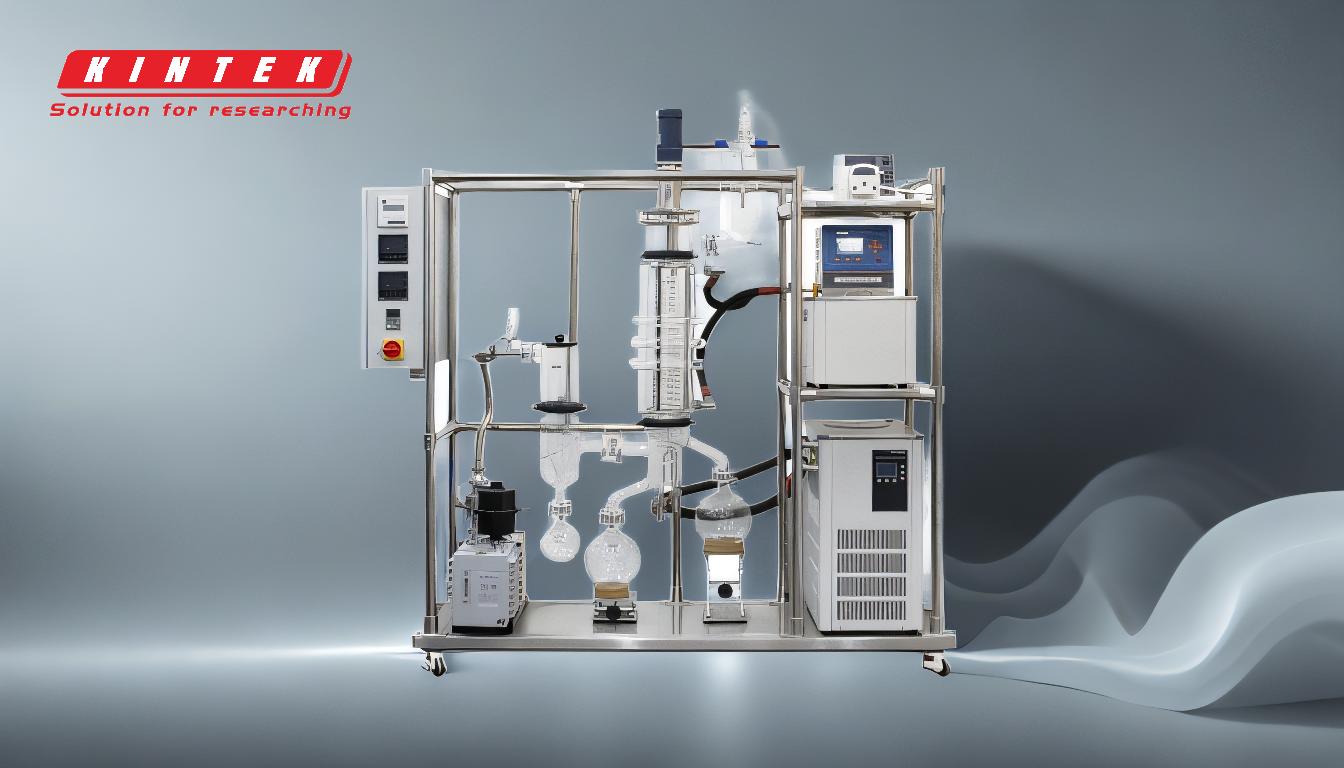Vacuum distillation is a specialized separation process that operates under reduced pressure, enabling the distillation of heat-sensitive compounds at lower temperatures. This method is particularly useful in industries where high temperatures could degrade the quality of the product. The process involves evaporating a liquid under vacuum, condensing the vapor, and collecting the purified liquid. Common applications include the distillation of essential oils, pharmaceuticals, and the desalination of water. The key advantage of vacuum distillation is its ability to preserve the integrity of delicate compounds by avoiding excessive heat.
Key Points Explained:

-
Principle of Vacuum Distillation:
- Reduced Pressure: Vacuum distillation operates at pressures below atmospheric pressure, which lowers the boiling point of liquids. This is based on the principle that the boiling point of a substance decreases as the surrounding pressure decreases.
- Temperature Control: By reducing the pressure, the process allows for distillation at much lower temperatures, which is crucial for heat-sensitive materials. For example, water boils at 100°C at sea level (1000 mbar), but at 45 mbar, it can boil at a much lower temperature, preserving the quality of the distilled product.
-
Types of Vacuum Distillation:
-
Multiple-Effect Distillation (MED):
- Process: MED involves a series of evaporators (effects) where the vapor from one effect is used to heat the next. This recycling of heat energy makes the process highly efficient.
- Applications: Commonly used in desalination plants, MED is effective for large-scale water purification.
-
Vapor-Compression Desalination (VCD):
- Process: VCD uses mechanical compression to increase the temperature of the vapor, which is then condensed to produce distilled water. The heat generated during compression is reused, enhancing energy efficiency.
- Applications: This method is often employed in smaller-scale desalination units and in industries where energy efficiency is a priority.
-
Multi-Stage Flash Distillation (MSF):
- Process: MSF involves heating seawater under pressure and then flashing it into a series of chambers at progressively lower pressures. The sudden drop in pressure causes rapid evaporation, and the vapor is condensed to produce distilled water.
- Applications: MSF is widely used in large-scale desalination plants, particularly in regions with limited freshwater resources.
-
Multiple-Effect Distillation (MED):
-
Advantages of Vacuum Distillation:
- Preservation of Quality: By operating at lower temperatures, vacuum distillation minimizes the risk of thermal degradation, making it ideal for distilling heat-sensitive compounds such as essential oils and pharmaceuticals.
- Energy Efficiency: The reuse of heat energy in processes like MED and VCD makes vacuum distillation more energy-efficient compared to traditional distillation methods.
- Versatility: Vacuum distillation can be applied to a wide range of liquids, including those with high boiling points or those that are prone to decomposition at high temperatures.
-
Applications of Vacuum Distillation:
- Essential Oils: Vacuum distillation is commonly used to extract essential oils from plants. The low-temperature process helps preserve the delicate aromatic compounds.
- Pharmaceuticals: In the pharmaceutical industry, vacuum distillation is used to purify and concentrate active ingredients without exposing them to high temperatures that could alter their chemical structure.
- Desalination: Vacuum distillation techniques like MED, VCD, and MSF are crucial in desalination plants, where they are used to produce fresh water from seawater.
-
Considerations for Equipment and Consumables:
- Vacuum Pumps: Essential for creating and maintaining the low-pressure environment required for vacuum distillation. The choice of pump depends on the desired vacuum level and the volume of vapor to be handled.
- Condensers: Used to cool and condense the vapor back into liquid form. The design of the condenser affects the efficiency of the distillation process.
- Heat Exchangers: In processes like MED and VCD, heat exchangers are critical for transferring heat between different stages of the process, improving overall energy efficiency.
- Materials of Construction: The equipment must be made from materials that can withstand the corrosive nature of some liquids and the vacuum conditions. Stainless steel and specialized alloys are commonly used.
In summary, vacuum distillation is a versatile and efficient method for separating and purifying liquids, particularly those that are sensitive to heat. The process is characterized by its ability to operate at lower temperatures, which helps preserve the quality of the distilled product. The different types of vacuum distillation, such as multiple-effect distillation, vapor-compression desalination, and multi-stage flash distillation, each have unique applications and advantages, making them suitable for various industries, from pharmaceuticals to desalination. When selecting equipment and consumables for vacuum distillation, it is important to consider factors such as the type of vacuum pump, condenser design, and materials of construction to ensure optimal performance and longevity of the system.
Summary Table:
| Aspect | Details |
|---|---|
| Principle | Operates under reduced pressure to lower boiling points and preserve quality. |
| Types | Multiple-Effect Distillation (MED), Vapor-Compression Desalination (VCD), Multi-Stage Flash Distillation (MSF). |
| Advantages | Preserves quality, energy-efficient, versatile for various liquids. |
| Applications | Essential oils, pharmaceuticals, desalination. |
| Equipment | Vacuum pumps, condensers, heat exchangers, corrosion-resistant materials. |
Learn how vacuum distillation can benefit your industry—contact our experts today!













